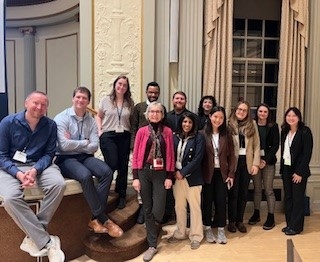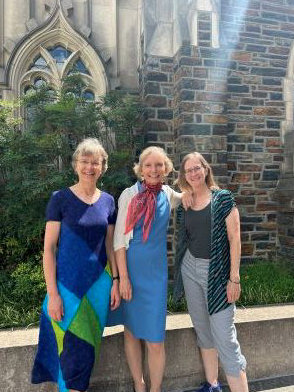
Multidisciplinary K12 Urologic Research Career Development Program
Funding opportunity for Duke junior faculty, fellows, and postdocs with doctoral degrees
Congratulations to our new KURe Scholar!

Christina Bergemann, PhD is a postdoctoral associate in the lab of Nazema Siddiqui, MD, MHSc. Her KURe research project is titled "Investigating mechanisms behind Lactobacillus crispatus colonization in the urinary microbiome."
About the KURe Program

The KURe recruits talented clinical, translational and basic science researchers (MD, DO, PhD, MD/PhD) who are interested in building an independent research career using collaborative, multidisciplinary approaches to benign urological research questions. Junior faculty, fellows and postdocs from any Duke department and interested in research applicable to benign urology may apply to the KURe program. For additional information, contact friederike.jayes@duke.edu or cindy.amundsen@duke.edu.
The KURe Program is a part of CAIRIBU, funded through NIDDK. CAIRIBU’s K12, P20, and U54 centers and programs are united around the overall objectives of improving understanding of the mechanisms of urogenital diseases and developing clinical therapies for treating them. Duke's KURe Program is a K12 Institutional Career Development Grant that provides scholars with career development training and support to develop the skills necessary to become outstanding independent investigators able to lead multidisciplinary research teams. Scholars receive salary support up to $100,000 per year for 75% of full professional effort (50% -75% if a surgical specialty). Research and Career Development Support up to $40,000 per year will be provided for research supplies, equipment and technical personnel; tuition and fees related to didactic courses or career development; and travel to research meetings. Scholars are expected to publish and apply for independent grant funding by Year 3.
KURe scholars also participate in the Research Scholars Educational Training (ReSET) Program which provides structured, real-time grant writing support and welcomes all OBGYN trainees, faculty, and K12 scholars. Lectures and workshops are held on the 4th Wednesday of each month at Baker House Room 214 from 9:30 - 11:00 AM.
- Scholars, are you submitting an external grant in the next 3-6 months? Request a personal Grant Development Support (GRADS) Team to help you get your grant out the door.
Learn more on the ReSET website.
Applications and Eligibility
Scholars should have no more than five years of postdoctoral research experience and not more than ten years should have elapsed since receiving the terminal doctoral degree. Mid-career and senior faculty are not eligible. Scholars must be a US citizen or have a valid green card. Applicants can be associated with any Duke department and should be pursuing a research career related to benign urology.
Research areas supported by this initiative must be related to the mission of the NIDDK. Areas of interest may include, but are not limited to, the following:
- Basic research such as cell and molecular biology, genomics and proteomics, biochemistry, physiology, developmental biology, tissue engineering, immunology, pathology, neurobiology and microbiology
- Clinical sciences such as urology, infectious disease, gastroenterology, gynecology, endocrinology, anesthesiology, neurology, gerontology and radiology
- Epidemiology or biostatistics
- Physical sciences such as physics, bioengineering, chemical and mechanical engineering
Program Contacts, Leadership and Staff

Principal Investigator and Program Director
Cindy Amundsen, MD
Scholars@Duke Bio
Program Coordinator
Friederike Jayes, DVM, PhD
Scholars@Duke Bio
Career Development Program Specialist
Rebecca Kameny, PhD
Scholars@Duke Bio